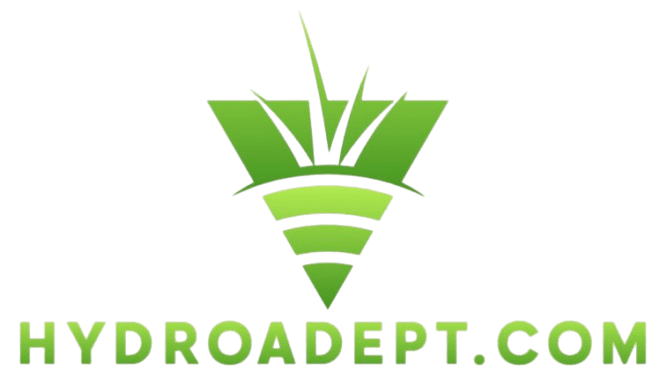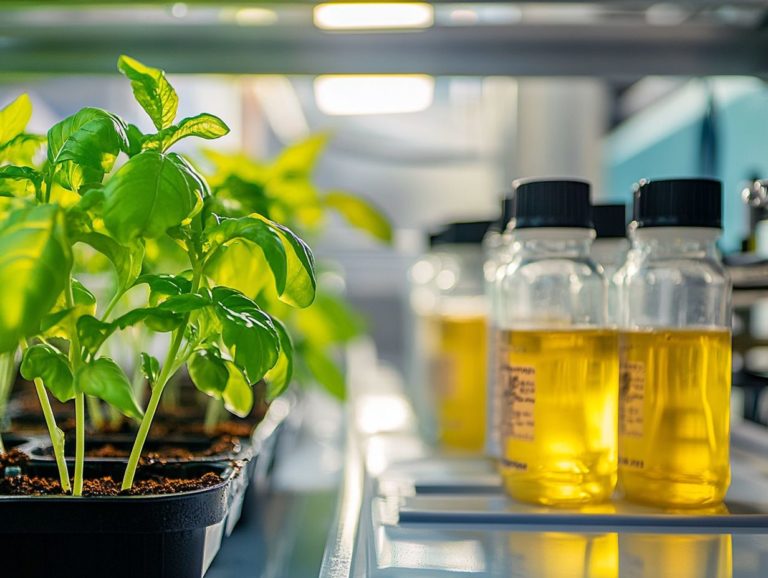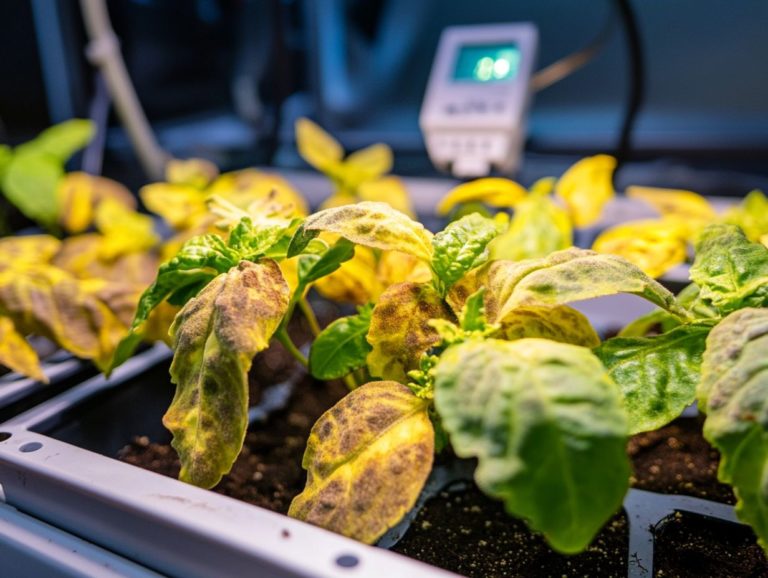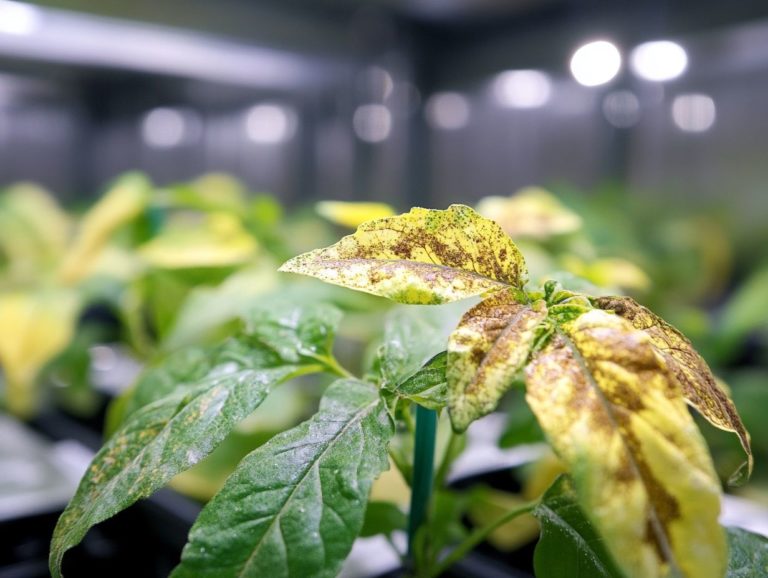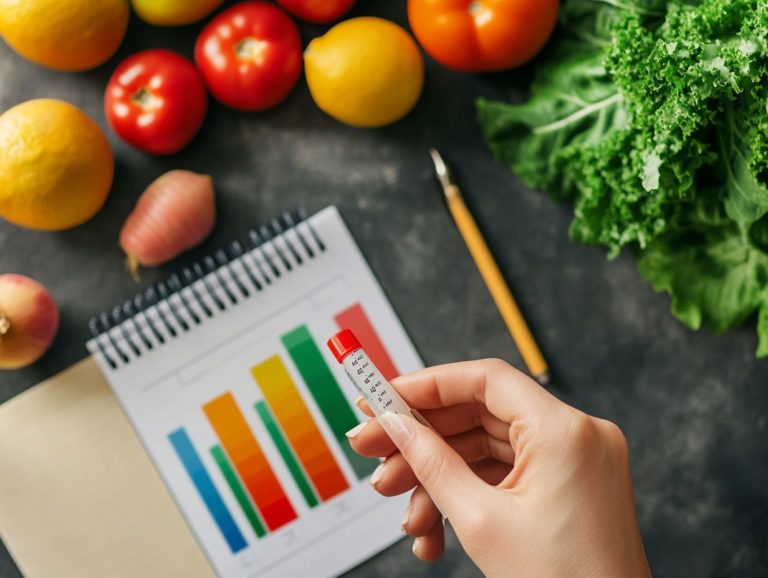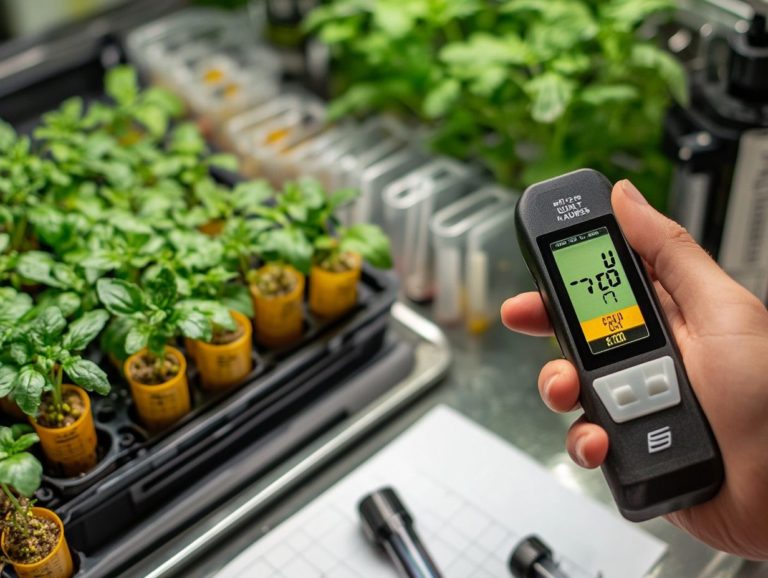The Best Hydroponic Nutrients for Fruit Production
Unlock the full potential of your plants with the right hydroponic nutrients! Grasping the right nutrients is vital for elevating fruit production to new heights.
This guide delves into essential elements like nitrogen, phosphorus, and potassium, which are fundamental for robust plant growth. You will also learn about secondary nutrients and micronutrients that play their part.
You’ll discover how to select the optimal nutrient solution and apply it with precision. Plus, you’ll troubleshoot common deficiencies that might arise.
It also examines the advantages and disadvantages of organic versus synthetic options. Whether you re a seasoned grower or just embarking on your hydroponic journey, this guide offers valuable insights tailored for everyone.
Contents
- Key Takeaways:
- Key Nutrients for Fruit Production
- Choosing the Right Nutrient Solution
- Factors to Consider
- Application and Dosage
- Best Practices for Feeding Plants
- Common Issues and Troubleshooting
- Organic vs. Synthetic Nutrients
- Frequently Asked Questions
- What are the ideal nutrients for growing fruit hydroponically?
- What are some examples of hydroponic nutrients that are specifically formulated for fruit production?
- Are Organic Hydroponic Nutrients Better for Fruit Production?
- Do Hydroponic Nutrients Need to Change During Growth?
- How Often Should Hydroponic Nutrients Be Added?
- Can These Nutrients Be Used for All Fruit Plants?
Key Takeaways:
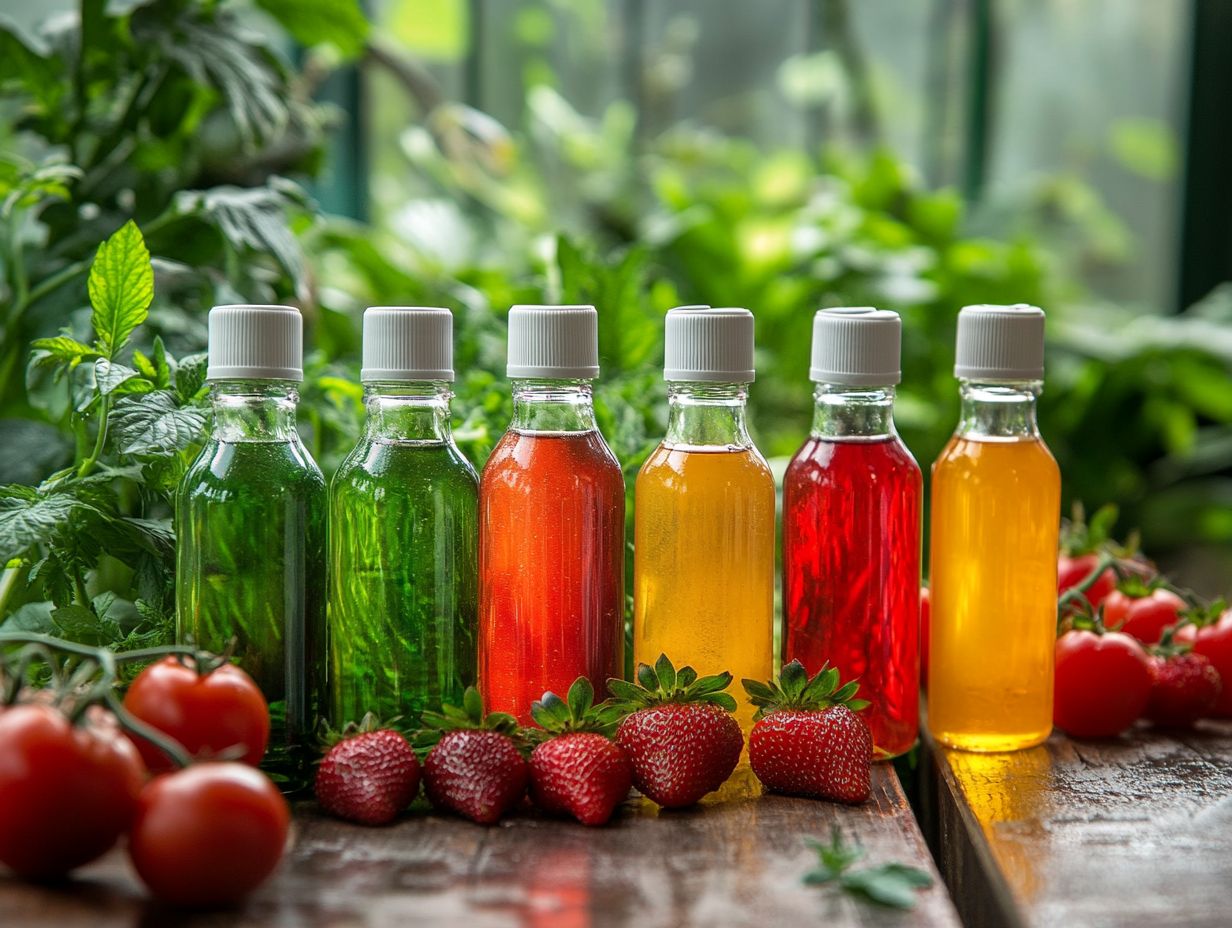
- Nitrogen, phosphorus, and potassium are essential for optimal fruit production in hydroponic systems.
- Consider factors such as plant type, growth stage, and water quality when choosing the right nutrient solution.
- Proper application and dosage of hydroponic nutrients are crucial for healthy plant growth and avoiding nutrient deficiencies.
What are Hydroponic Nutrients?
Hydroponic nutrients are absolutely vital for your success in hydroponic gardening. They provide your plants with the essential nutrients they crave without the soil. This allows you to leverage nutrient solutions for optimal growth.
These solutions typically combine a mix of macronutrients, which are nutrients needed in larger amounts, and micronutrients, which are required in smaller quantities. This is tailored to the specific needs of various plants, from leafy greens to fruiting varieties.
This ensures you’re maximizing water efficiency and creating ideal growth conditions. Understanding these nutrients and their effects on pH levels and nutrient absorption is crucial for any aspiring hydroponic gardener.
This is especially important in urban farming settings, where soil alternatives are increasingly popular. To achieve the best results in your hydroponic systems, take the time to explore the different types of nutrients available.
Complete blends can provide a balanced ratio of essential elements like nitrogen, phosphorus, and potassium. Incorporating products like calcium and magnesium can enhance the vigor of your plants.
Trace minerals such as iron and manganese will support their overall health and productivity. You can create homemade nutrient solutions with ingredients like Epsom salts and fish emulsion, tailored to meet the unique needs of various plant species.
Maintaining high water quality is non-negotiable; contaminants can wreak havoc on your growth. Regularly monitoring electrical conductivity (EC) levels ensures that your nutrient solution is at the optimal concentration.
Techniques like pH testing can help you maintain the ideal range for nutrient absorption. By integrating these practices into your hydroponic setup, you’ll significantly boost the success and yield of your plants.
Key Nutrients for Fruit Production
In hydroponic systems, key nutrients are paramount for boosting fruit production. Plants depend on nutrient solutions abundant in nitrogen, phosphorus, and potassium to flourish.
These macronutrients are critical for the overall health of fruiting plants. They shape their growth patterns, fruit yield, and quality.
By grasping the specific needs of various fruit varieties, you can significantly enhance your urban farming endeavors. This allows you to customize nutrient delivery to maximize production, even in limited spaces.
Start experimenting with these nutrient solutions today and watch your hydroponic garden thrive!
Nitrogen, Phosphorus, and Potassium
Nitrogen, phosphorus, and potassium are the three important nutrients you need to keep your plants thriving, especially in hydroponic gardening. These nutrients directly impact growth and yield.
Nitrogen promotes lush vegetative growth, phosphorus is vital for robust root development and energy transfer, while potassium regulates water balance and overall plant function.
Understanding the specific functions of these nutrients helps you optimize your nutrient solutions for different plants. This ensures a fruitful growing experience, whether you re nurturing leafy greens or fruiting varieties.
To grasp how each nutrient influences plant health, recognize the signs of deficiencies. For example, yellowing leaves and stunted growth may indicate a nitrogen deficiency. Insufficient phosphorus can lead to poor root development and weak flowering. Meanwhile, a potassium deficiency often appears as browning leaf edges and increased vulnerability to disease.
Addressing these challenges is straightforward. Regularly test your nutrient solutions and adjust concentrations as needed. Tailoring your nutrient mixes to the specific growth stages of your plants boosting nitrogen for leafy greens and increasing potassium when they re fruiting can significantly enhance their vigor and productivity.
Secondary Nutrients and Micronutrients
In hydroponic gardening, recognizing the critical roles of secondary nutrients and micronutrients alongside the primary nutrients is essential. These elements are vital for your plants’ overall health and productivity.
Key secondary nutrients like calcium, magnesium, and sulfur support various plant functions. Micronutrients such as iron, manganese, and zinc are essential for enzymatic processes and chlorophyll production.
Understanding the importance of these nutrients allows you to craft a well-rounded nutrient solution that meets all your plants’ needs, ensuring they grow healthily and yield robust results.
Calcium is crucial for maintaining cell wall structure and stability, helping prevent issues like blossom end rot in fruits. Magnesium is essential for photosynthesis; low levels may cause interveinal chlorosis on older leaves. Sulfur plays a role in protein synthesis and contributes to the formation of flavorful compounds.
For micronutrients, watch for signs of deficiency. Iron shortages can manifest as yellowing leaves and stunted growth, while a lack of manganese may disrupt your plants’ metabolic functions. Regularly testing nutrient levels allows you to pinpoint deficiencies and implement timely strategies, such as foliar sprays or targeted nutrient solutions, fostering an environment where your plants can thrive.
Choosing the Right Nutrient Solution
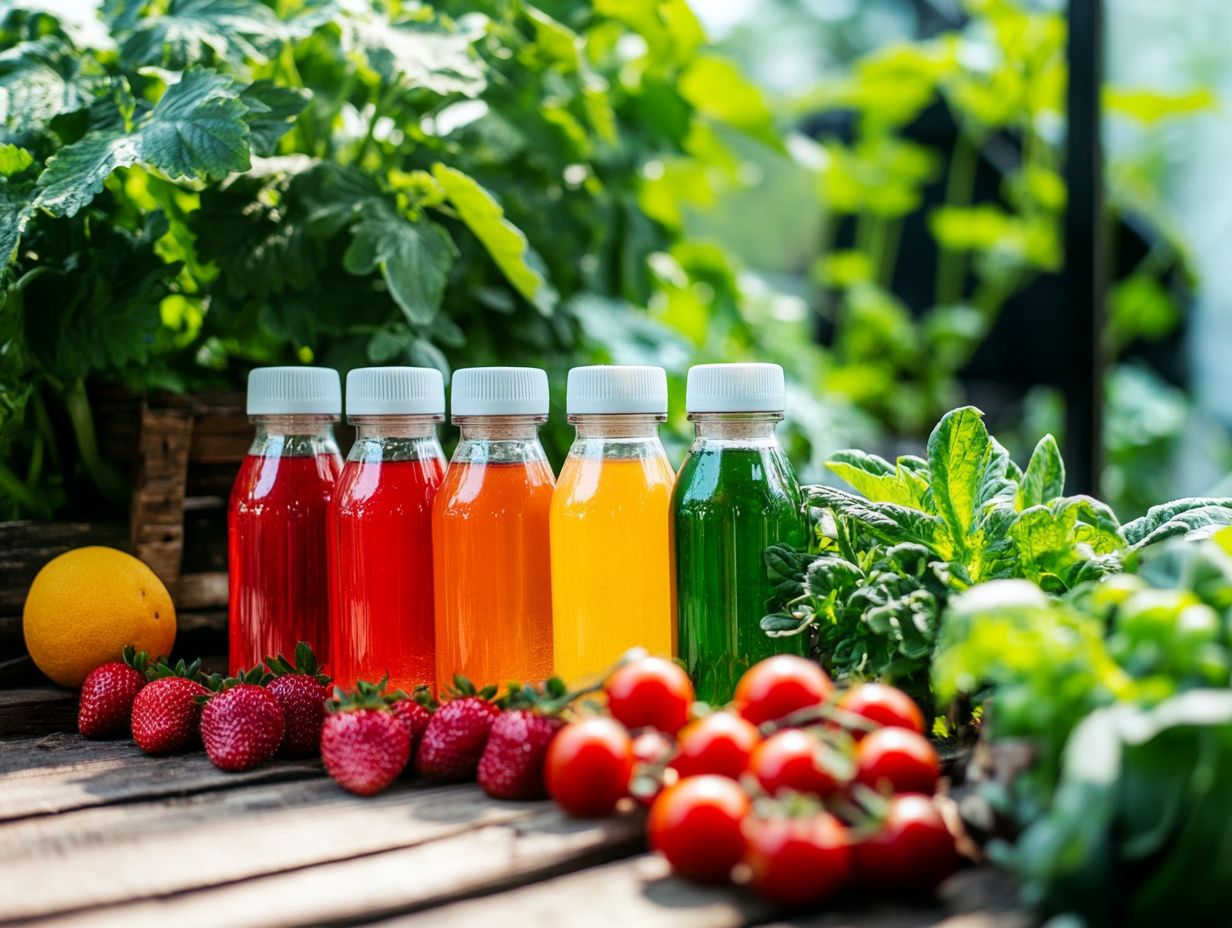
Selecting the ideal nutrient solution is a pivotal decision in hydroponic gardening. It profoundly influences plant growth, yield, and overall health. Consider several key factors, such as the types of plants you re cultivating, their specific nutrient needs, and the quality of water in your hydroponic system.
Regular nutrient testing is vital to maintain a balanced and effective solution. This helps you adjust your formulations based on real-time data and the distinct requirements of your crops, ensuring your gardening endeavors flourish.
Start testing your nutrient solutions today for a thriving garden!
Factors to Consider
When choosing nutrient solutions for your hydroponic garden, several key factors need your attention to ensure optimal plant growth and nutrient absorption. Water quality is paramount, with pH levels and electrical conductivity (EC) playing crucial roles in how effectively your plants can utilize the nutrients at their disposal.
The specific nutrient needs of your crops be they leafy greens or fruiting plants should guide you in creating nutrient solutions to promote vigorous growth and maximize yields.
Water quality comprises more than just pH; it also involves considerations like the presence of impurities, the source of your water, and its mineral content. For instance, while some crops may flourish in lower pH, others might prefer more neutral conditions.
Electrical conductivity (EC) measures how well a nutrient solution conducts electricity, indicating its concentration. This is another vital factor, as it indicates how concentrated your nutrient solution is.
Adjusting these parameters according to the growth stages of your crops can significantly enhance nutrient uptake.
By understanding the unique nutrient profiles that individual plants require, such as higher potassium levels for thriving tomatoes, you can create customized solutions that meet these specific needs. For further assistance, consider exploring the best nutrient management apps for hydroponics. This ensures robust health and maximum yield from your hydroponic system.
Application and Dosage
The proper application and dosage of nutrients in hydroponic systems are crucial for optimizing plant health and productivity. Ensure your plants receive the right amount of nutrients at each growth stage.
Since different plants have unique nutrient requirements, understanding these needs is key to effective feeding practices. By regularly testing your nutrients, you can determine the precise amounts needed. This enables you to make adjustments to prevent deficiencies or excesses that could hinder plant growth.
Best Practices for Feeding Plants
Implementing best practices for feeding plants in hydroponic systems is essential for achieving optimal growth and yield. You need to ensure that nutrient solutions are delivered effectively to meet the specific needs of each plant.
Regularly monitoring pH levels and EC levels, adjusting nutrient concentrations based on plant growth stages, and maintaining water quality are all crucial components of successful hydroponic gardening.
Understanding the differences in nutrient absorption and requirements for various crops such as leafy greens like arugula and basil versus fruiting plants will guide your practices.
For example, leafy greens like lettuce and cucumber thrive on a nitrogen-rich nutrient profile, especially during their early growth stages. This means you ll need to make frequent adjustments to fertilizer concentrations.
On the other hand, fruiting plants like tomatoes require different nutrient ratios as they move from vegetative to flowering stages. This compels you to keep a close watch on their nutrient solutions.
Employing techniques such as observing leaf color, spotting growth patterns, and utilizing tools like EC meters and pH testers will help you fine-tune your feeding regimen. You might also consider homemade solutions for nutrient delivery.
By adapting these methods based on your ongoing observations, you create a more responsive and efficient hydroponic environment that caters to the ever-changing needs of your plants.
Common Issues and Troubleshooting
In hydroponic systems, common challenges frequently arise from nutrient deficiencies, including deficiencies in copper, boron, and molybdenum. These can profoundly affect plant growth and yield if not addressed promptly. Identify these deficiencies immediately to maintain a thriving growing environment.
Pay close attention to your plants; symptoms like discoloration or stunted growth serve as vital indicators. By recognizing these signs, you can fine-tune your nutrient solutions and significantly improve overall plant health.
Identifying and Addressing Nutrient Deficiencies
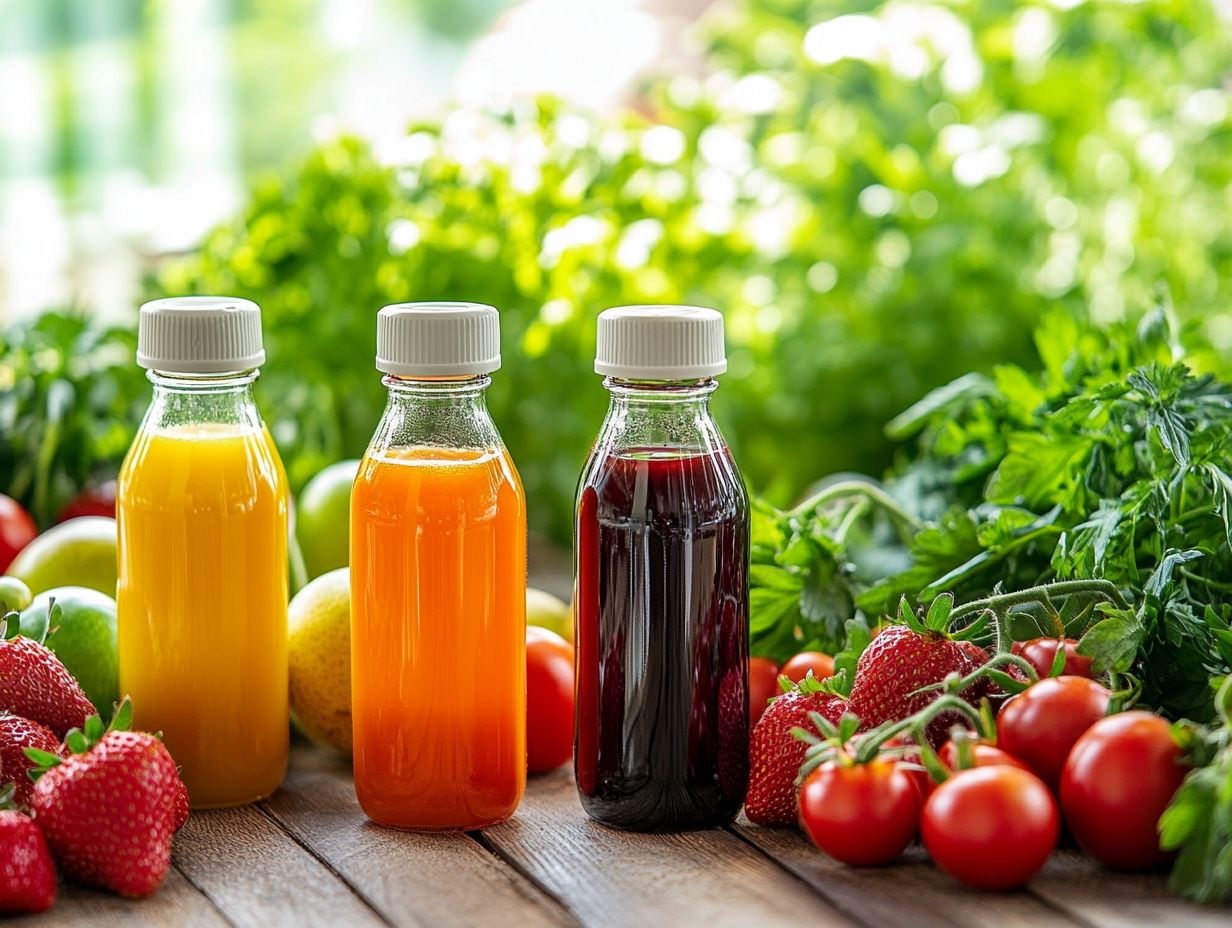
Identifying nutrient deficiencies is essential for successful hydroponic gardening. This is especially true in vegetable gardening, as deficiencies can manifest through various symptoms that impact plant growth and health.
For instance, if you notice the leaves of your plants turning yellow, it could indicate a nitrogen deficiency, which is essential for chlorophyll production. If growth appears stunted, it may signal a lack of phosphorus, vital for root development and energy transfer. Poor fruit production often points to potassium deficiency.
By recognizing these signs, you can make the necessary adjustments to your nutrient solutions. Increasing nitrogen levels, adding phosphorus-rich supplements, or boosting potassium can significantly enhance your plants’ performance.
Adopting a proactive approach, such as regular pH testing and customizing your nutrient delivery to include essential elements for both leafy greens and fruiting plants, will ensure your garden flourishes. For optimal results, consider using the best nutrient brands for hydroponic gardens, ultimately leading to a bountiful harvest.
Organic vs. Synthetic Nutrients
The debate over organic versus synthetic nutrients in hydroponics presents a fascinating array of pros and cons that can profoundly impact your plant growth and yield outcomes, particularly in vegetable gardening. Organic nutrients, sourced from natural materials, can enrich soil quality and foster biodiversity, creating a thriving ecosystem.
In contrast, synthetic nutrients provide a more controlled and immediate way to supply nutrients, catering to specific plant needs. By understanding these distinctions, you can make informed decisions that align perfectly with your gardening goals and the unique requirements of your plants.
Understanding Organic vs. Synthetic Nutrients: Pros and Cons
When evaluating organic and synthetic nutrients for hydroponics, consider the exciting pros and cons of each option to find the perfect match for your gardening style and the specific needs of your plants. Organic nutrients bring benefits like enhanced microbial activity and long-term soil health, while synthetic nutrients offer precise control over nutrient delivery and deliver rapid results.
It’s also essential to consider the environmental implications of your choices. Organic fertilizers, sourced from natural materials, often help reduce chemical runoff and support biodiversity within ecosystems. Conversely, while synthetic options provide quick nutrient uptake, their production processes can raise environmental concerns.
For those passionate about urban farming, understanding these differences helps you make decisions that not only boost crop productivity but also align with broader ecological goals and community health. Choose wisely for quick results that transform your gardening today!
Frequently Asked Questions
What are the ideal nutrients for growing fruit hydroponically?
The best hydroponic nutrients for fruit production are those that provide a balance of essential macronutrients (such as nitrogen, phosphorus, and potassium) and micronutrients (such as calcium, magnesium, and iron) for optimal plant growth and fruit development.
What are some examples of hydroponic nutrients that are specifically formulated for fruit production?
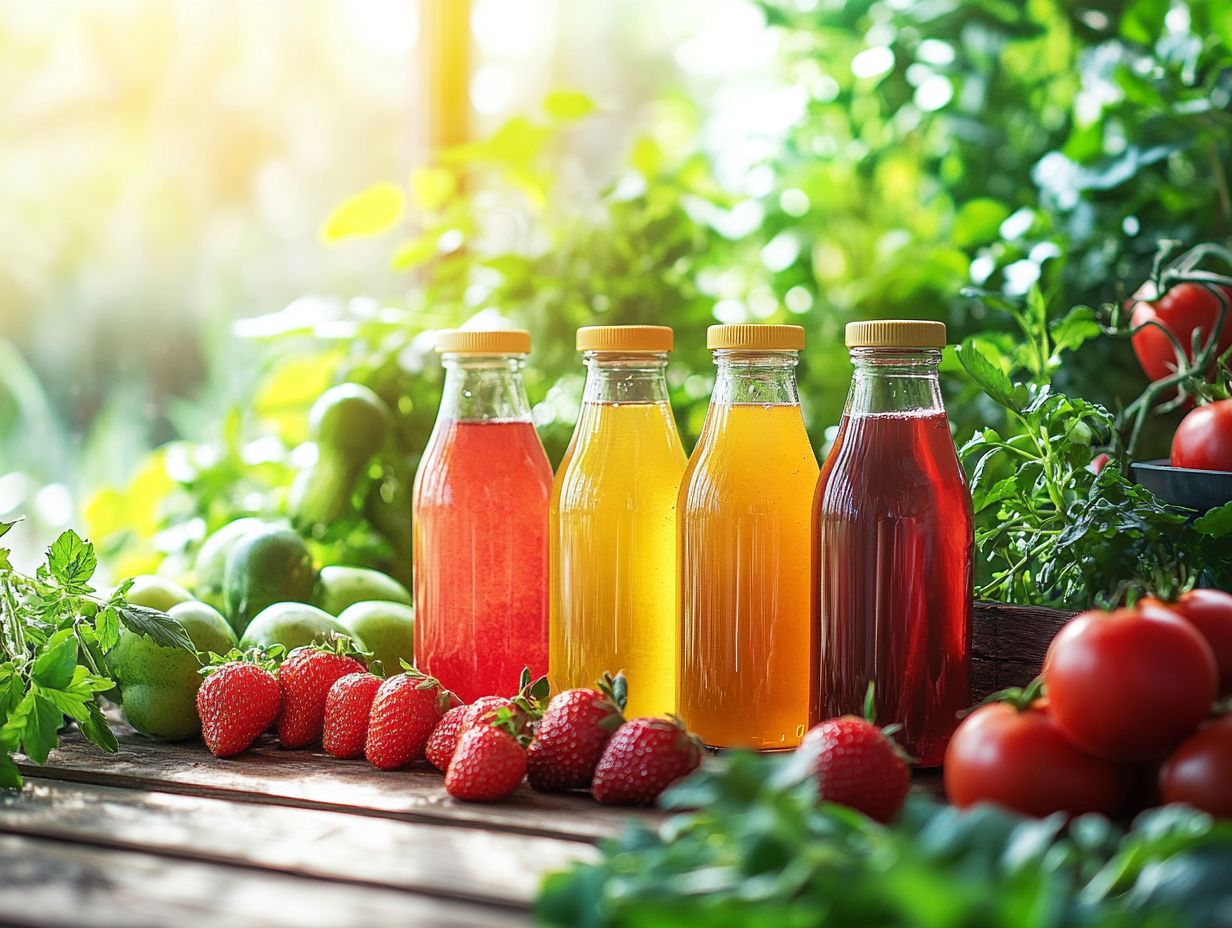
Examples of hydroponic nutrients that are specifically formulated for fruit production include General Hydroponics Flora Series, Fox Farm Tiger Bloom, and Advanced Nutrients pH Perfect Sensi Bloom.
Start testing your nutrient solutions today for a thriving garden!
Are Organic Hydroponic Nutrients Better for Fruit Production?
Organic hydroponic nutrients come from natural sources. They often provide a balanced mix of nutrients for plants.
Synthetic nutrients can also work well for fruit production. It all depends on what the plants need at any given time.
Do Hydroponic Nutrients Need to Change During Growth?
Yes, you should change hydroponic nutrients throughout the plant’s growth cycle. Plants require different nutrients at different stages.
For instance, they need more nitrogen during the vegetative stage for leaf growth. During flowering and fruiting, they need more phosphorus and potassium.
How Often Should Hydroponic Nutrients Be Added?
The frequency of adding nutrients depends on the nutrient solution and the plants’ needs. Generally, add new solution every 1-2 weeks.
Regularly monitor the nutrient levels to ensure the plants thrive.
Can These Nutrients Be Used for All Fruit Plants?
Yes, hydroponic nutrients for fruit production can support many fruit plants, including berries and citrus fruits. However, it s crucial to adjust the nutrient solution to fit the specific needs of each plant.
